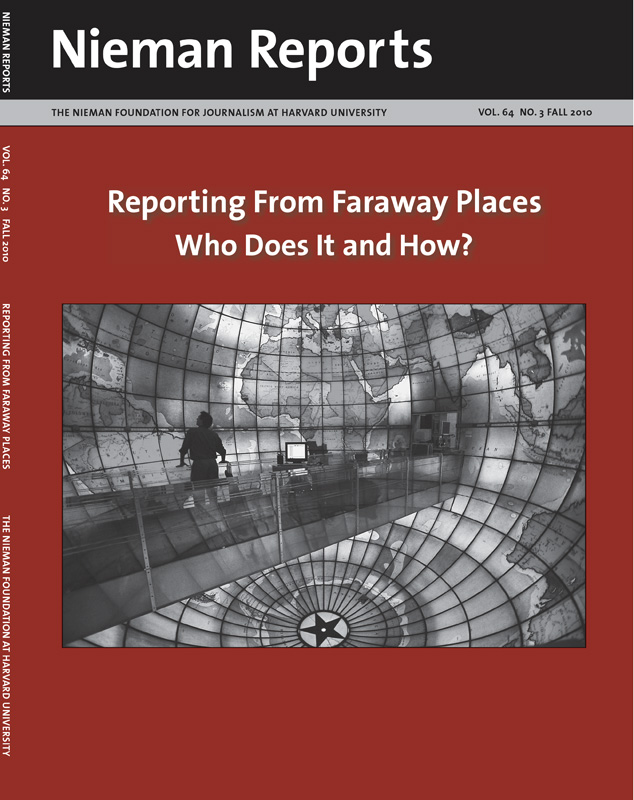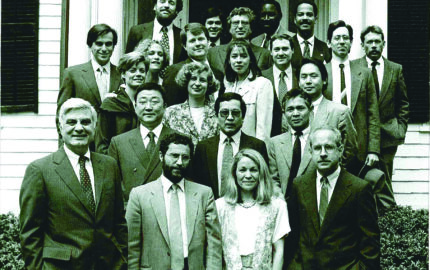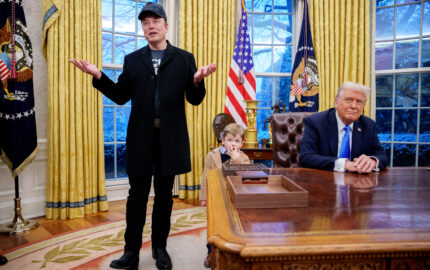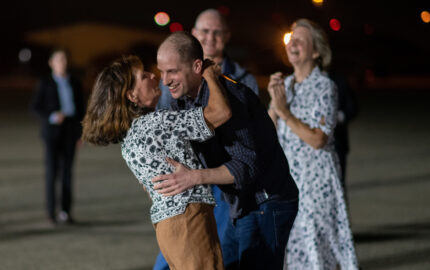The e-mail message from Hollman Morris was unexpected. It was “urgent,” he said. “Please call immediately on Skype.” I reached him and his brother, Juan Pablo, in Bogota. His image on the computer screen revealed a stricken man at pains to say that he had just been told by the United States Embassy in Bogota that it had denied his application for a visa to travel to Cambridge for his Nieman Fellowship.
Hollman said the denial was based on accusations by the Colombian government linking him to the leftist guerrilla group FARC. His probing television reports had disclosed abuses by the country’s intelligence agency, angering the Colombian government. Particularly, he said, his travel to southern Colombia to interview senior FARC leaders for a documentary on kidnappings had raised suspicions.
He shared his fears that these serious allegations would endanger his life. As I said goodbye, I repeated our assurance that the Nieman Foundation would do all it could to reverse the U.S. State Department’s decision. At that moment, on June 18, it seemed like an empty promise.
What a paradox. The government of the United States, with its longstanding commitment to press freedom worldwide, was turning away a journalist whose groundbreaking work had exposed him to persecution by his own government and the grave possibility of personal violence. Colombian officials have accused Morris of being “close to the guerrillas” and “an accomplice of terrorism,” but the State Department’s denial made little sense against its own history of granting him visas to enter the U.S. to accept awards and make speeches. Could this decision be an unintended consequence of our national obsession with terrorism?
The task of trying to reverse the decision seemed daunting. I turned first to the Committee to Protect Journalists whose mission it is to protect journalists worldwide. Joel Simon, the executive director, knows Hollman and the prominence of his work and moved quickly to build a coalition that would explore how to undo the decision. In a series of conference calls, we decided first to gather as much information as we could and to quietly reach out to sources in the State Department and in Congress.
I called Scott Renner at the U.S. Embassy in Bogota to ask for a clarification of the reasons for the visa denial. He said that Hollman was ineligible for a visa under a provision of the Immigration and Nationality Act covering “terrorist activities.” He said the denial was permanent and that the federal Privacy Act restricted him from saying more.
With guidance from Harvard’s general counsel, I wrote to the State Department’s office of consular affairs with details of Hollman’s exemplary work as a journalist and asked for a review of his case for a visa. The story became public on July 9 in a dispatch from Frank Bajak, The Associated Press’s bureau chief in Bogota. Juan Forero followed the next day with a piece in The Washington Post. I was asked to write an op-ed for the Los Angeles Times, and soon news spread widely via Twitter and Facebook.
Stories, columns and editorials followed. Thoughtful, persuasive letters to the State Department, the White House, and Alvaro Uribe, then president of Colombia, were written by Human Rights Watch, Committee to Protect Journalists, John S. and James L. Knight Foundation, Inter-American Commission on Human Rights, Organization of American States, American Civil Liberties Union, International Federation of Journalists, Dart Center for Journalism and Trauma, National Association of Hispanic Journalists, International Press Institute, North American Congress on Latin America, the journalism school faculty at the University of Texas, and other organizations.
Nieman Fellows wrote to express outrage and ask what they might do. I called on members of the Nieman class of 1988 to contact their classmate, Juan Manuel Santos, who was to become president of Colombia on August 7.
As efforts continued, documents were disclosed revealing that the Colombian intelligence agency had conducted a systematic campaign to discredit and harass Hollman.
A number of separate back channel contacts reaching into the White House and the highest levels of the State Department gave us hope that the visa decision might be reconsidered. As a security measure, Hollman took his family to Spain where, on July 22, he sent an e-mail saying, “There is good news that I hope to share with you in full detail as soon as I return to my country and have a new conversation with the consulate.”
A week later Hollman called with a joy in his voice to say that he and his family had their visas and would join his Nieman classmates. Over and over, he said how happy he felt and thankful he was to have friends and colleagues who supported him. Overcoming the improbable odds of persuading the State Department to change its mind was made possible by an inspiring community effort.
Hollman said the denial was based on accusations by the Colombian government linking him to the leftist guerrilla group FARC. His probing television reports had disclosed abuses by the country’s intelligence agency, angering the Colombian government. Particularly, he said, his travel to southern Colombia to interview senior FARC leaders for a documentary on kidnappings had raised suspicions.
He shared his fears that these serious allegations would endanger his life. As I said goodbye, I repeated our assurance that the Nieman Foundation would do all it could to reverse the U.S. State Department’s decision. At that moment, on June 18, it seemed like an empty promise.
What a paradox. The government of the United States, with its longstanding commitment to press freedom worldwide, was turning away a journalist whose groundbreaking work had exposed him to persecution by his own government and the grave possibility of personal violence. Colombian officials have accused Morris of being “close to the guerrillas” and “an accomplice of terrorism,” but the State Department’s denial made little sense against its own history of granting him visas to enter the U.S. to accept awards and make speeches. Could this decision be an unintended consequence of our national obsession with terrorism?
The task of trying to reverse the decision seemed daunting. I turned first to the Committee to Protect Journalists whose mission it is to protect journalists worldwide. Joel Simon, the executive director, knows Hollman and the prominence of his work and moved quickly to build a coalition that would explore how to undo the decision. In a series of conference calls, we decided first to gather as much information as we could and to quietly reach out to sources in the State Department and in Congress.
I called Scott Renner at the U.S. Embassy in Bogota to ask for a clarification of the reasons for the visa denial. He said that Hollman was ineligible for a visa under a provision of the Immigration and Nationality Act covering “terrorist activities.” He said the denial was permanent and that the federal Privacy Act restricted him from saying more.
With guidance from Harvard’s general counsel, I wrote to the State Department’s office of consular affairs with details of Hollman’s exemplary work as a journalist and asked for a review of his case for a visa. The story became public on July 9 in a dispatch from Frank Bajak, The Associated Press’s bureau chief in Bogota. Juan Forero followed the next day with a piece in The Washington Post. I was asked to write an op-ed for the Los Angeles Times, and soon news spread widely via Twitter and Facebook.
Stories, columns and editorials followed. Thoughtful, persuasive letters to the State Department, the White House, and Alvaro Uribe, then president of Colombia, were written by Human Rights Watch, Committee to Protect Journalists, John S. and James L. Knight Foundation, Inter-American Commission on Human Rights, Organization of American States, American Civil Liberties Union, International Federation of Journalists, Dart Center for Journalism and Trauma, National Association of Hispanic Journalists, International Press Institute, North American Congress on Latin America, the journalism school faculty at the University of Texas, and other organizations.
Nieman Fellows wrote to express outrage and ask what they might do. I called on members of the Nieman class of 1988 to contact their classmate, Juan Manuel Santos, who was to become president of Colombia on August 7.
As efforts continued, documents were disclosed revealing that the Colombian intelligence agency had conducted a systematic campaign to discredit and harass Hollman.
A number of separate back channel contacts reaching into the White House and the highest levels of the State Department gave us hope that the visa decision might be reconsidered. As a security measure, Hollman took his family to Spain where, on July 22, he sent an e-mail saying, “There is good news that I hope to share with you in full detail as soon as I return to my country and have a new conversation with the consulate.”
A week later Hollman called with a joy in his voice to say that he and his family had their visas and would join his Nieman classmates. Over and over, he said how happy he felt and thankful he was to have friends and colleagues who supported him. Overcoming the improbable odds of persuading the State Department to change its mind was made possible by an inspiring community effort.



